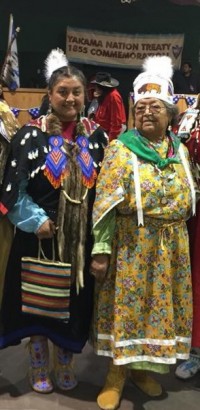In the Latest Edition of River Currents, Columbia Riverkeeper Recently Sat Down with Laurene Contreras, the Program Manager of Yakama Nation’s Agency Devoted to Hanford Cleanup.
Laurene Contreras, Yakama, is the program manager of Yakama Nation’s agency devoted to Hanford cleanup, the Environmental Restoration and Waste Management Program (ERWM). Laurene took the helm at ERWM in 2018 after working for the tribe for 30 years. ERWM was founded by Atwai Russell Jim, a Yakama Nation leader well-known by tribes and environmentalists across the nation for his fight to clean up Hanford.
Riverkeeper: You’ve had the opportunity to tour the Hanford Nuclear Site. What is it like?
Contreras: The site is over 500 square miles, so I haven’t seen all of it. You can still see remnants of historical buildings—the old high school, a bank, sidewalks, homesteads—where families lived. I’ve also visited areas significant to Yakama Nation for religious and spiritual practices. Tribal members still go to some of these specific sites to harvest plants and medicines for private and protected activities. Some of these religious areas are places the U.S. Dept. of Energy (Energy) wants to open up for wider-spread recreation, but we are working to make sure that the site is protected and preserved for maintaining our cultural practices.
Riverkeeper: What motivated you to take the helm at ERWM?
There are many reasons I took on this role—I believe the most important being the legacy of Atwai Russell Jim. He was wise enough to see the serious challenges that our community faced and took it upon himself to get the community involved in Hanford cleanup to honor its historical, cultural, and spiritual significance.
Contreras: I didn’t initially apply for the job because of the magnitude of the role. My mom encouraged me with reminders about our time spent fishing and gathering at Hanford. “This land is yours and our ancestors,” she said. “Why don’t you think you would be able to take on this role—and to be a voice, and help where needed?” She had a profound influence on my decision to pursue and accept the position.
Riverkeeper: Can you explain Yakama Nation ERWM’s role in Hanford cleanup?
Contreras: The ERWM program formed in 1982 after years of advocacy by Atwai Russell Jim, who experienced first-hand the importance of the site. His advocacy led him to Washington D.C. to form a cooperative agreement with Energy to clean up Hanford. Overall, Yakama Nation’s role is to advocate that radioactive waste be cleaned up until Hanford is restored to its original health. We know that with the amount of contamination, there is still a long future of work, but we will always advocate for the best possible restoration outcome.

Riverkeeper: Please share your thoughts on how Columbia Riverkeeper works in solidarity with Yakama Nation on Hanford cleanup.
Contreras: Riverkeeper is one of the first groups I met when I started in 2018. We worked together on the Hanford Journey to celebrate the commitment to the land that Atwai Jim embraced. Early on, I realized that our work together symbolized a mutual commitment to water quality because it sustains us all. Yakama Nation and Riverkeeper share a common goal to protect Hanford and clean water, and to do it in a way that engages and brings together communities. I got to feel all of these connections at the Hanford Journey, which brought together Yakama Nation tribal members, and a wide range Riverkeeper members. I really appreciate Riverkeeper for making this a regional issue about protecting land and the river that sustains our people and salmon, our most important food source.
Riverkeeper: What people inspired your career at the intersection of tribal sovereignty and natural resources?
Contreras: I’ve been inspired by many, always through a connection to the land and spirituality. I was born and raised on the Yakama Reservation treaty fishing, gathering, and participating in life’s practices through a connection to the land. Many of our teachings come from oral and ancestral knowledge. This is where my inspiration began—from my family and experiencing the cycles of life. Our father always wanted us to know how to work hard, and set that example as we spent summers fishing with family and stocking up for the winter. I also had the pleasure of working with Atwai Jim when I was in high school. It was the first time I heard a tribal member pushing education. He would ask all the students: “How are you preparing now for your future? How are you going to use your knowledge? How will you help your people?”
Riverkeeper: What keeps you inspired to work on Hanford cleanup during the COVID-19 pandemic?
Contreras: The Yakima Valley is considered a hot spot for the outbreak on the West Coast, which is a growing concern. Tribal members have been affected, so the pandemic is hitting close to home. We take precautions to protect our staff and community—but projects are ongoing, and the work does not stop. We have staff working remotely to check-in and provide feedback.
Partnering with Riverkeeper on youth education is a big motivation right now. We are shifting into the virtual world with more videos and webinars. We were really grateful for the opportunity to participate in Riverkeeper's webinar this spring about the high risks at Hanford and the concerns about the short-term strategies being taken by Energy to mitigate radioactive leaking and contamination.
Get inspired by the last 20 years of impactful work in solidarity with local and regional heroes of our movement.


